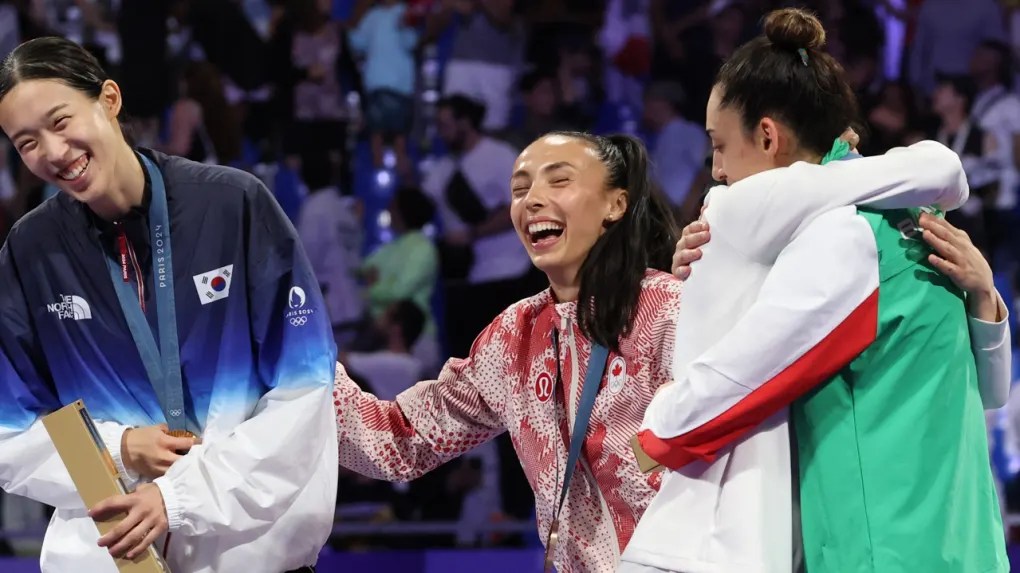I struggle to find the right title, perhaps because these words—nation, country, people—have lost their weight, their truth. For many of us, they are no longer symbols of pride or belonging. This isn’t just because I’ve wandered for over 12 years, moving from one place to another, but because the idea of a “nation” itself has been hollowed out, especially for Iranians. Look at this image from the Olympics: four athletes, their medals gleaming, but their stories speak louder than the shine of their achievements, especially the two who embraced each other.
On the right side stands Kimia Alizadeh, a name that once brought hope to Iran. In 2016, at the Rio Olympics, she became the first Iranian woman to win an Olympic medal, a bronze in taekwondo. She was just 18 then, not only the youngest Iranian medalist but also the youngest from any Middle Eastern country to ever achieve such a feat. Yet, despite her historic triumph, Kimia left Iran in December 2019, in protest against the hypocrisy of a regime that celebrated her success but silenced her voice.
In her own words, she was “one of millions of oppressed Iranian women,” frustrated and tired of being paraded as a symbol of state propaganda. She chose the uncertain path of exile over the familiar yet suffocating climb of success within a system built on deceit and corruption. For this, she was branded a traitor, her name smeared across the media. In the last Olympics, she fought under the flag of the Refugee Olympic Team, and now she represents Bulgaria, far from the land that once claimed her as its own.
Other side is Nahid Kiani, who officially represented Iran at these games and won a silver medal. Her victory is indeed historic because it is the highest medal achieved by an Iranian woman in the Olympics to date. In response to the question about her expectations, she said that she has endured many hardships and expects a lot of support. She dedicated her medal to the people of Iran. However, in Iranian media, Nahid’s words became a weapon against Kimia.
Alongside these two, there is another Iranian female athlete who has a different story. Mobina Nematzadeh. She is the second woman in Iran’s history to win an Olympic medal. She dedicated her medal to the Twelfth Imam of Shia Islam, and demand for free and accessible higher education. A natural and human right that millions are simply denied. In doing so, she submits to the public policies of the regime while an Olympic microphone was in front of her: flattery and religious propaganda!
And later she was granted admission to the University of Tehran. A reward for loyalty, in a country where allegiance is often bought at the cost of one’s soul. She is now a popular face in Iranian media, especially after Nahid, contrary to expectations, embraced Kimia and didn’t say anything that would please the regime’s propaganda machine.
But what does nationality mean when you are cast aside for your beliefs, your language, your culture? What does it mean to be part of a nation when, as a woman, you must navigate a maze of double discrimination? For some Iranians, especially in a country so vast and diverse, nationality is a fractured concept, far removed from the simple, often romanticized notions held in the West.
In this same Olympic moment, Iran’s national TV censored the image of Kimia and Nahid embracing each other. On live TV, the hosts repeatedly humiliated Kimia and criticized her for leaving Iran. It was during this time that the live broadcast was interrupted because Nahid and Kimia embraced each other. They couldn’t let the Iranian see this unity. The dehumanization of opponents and critics has historically been a fundamental practice of conservatives, particularly among the religious.
Among the 36 athletes competing under the Refugee Olympic Team, 14 are Iranian—14 people who have found themselves adrift, caught between a homeland that pushes them away and a world that only partially welcomes them.
Kimia Alizadeh, after receiving the bronze medal, said: “I won this medal for the Bulgarian team, for Iran, and especially for refugees.”
This is the story of a nation—no, not just a nation, but of people who have been severed from the very idea of home. The medals they wear are heavy, not just with the weight of victory, but with the burden of a fractured identity.
چهکسی میخواهد منوتو ما نشویم؟
— Pooyan Moghaddassi | پویان مقدسی (@PooyanMoghadasi) August 8, 2024
خانهاش ویران باد!
من اگر ما نشوم، تنهایم!
تو اگر ما نشوی، خویشتنی…
حمید مصدق#کیمیا_علیزاده#ناهید_کیانی pic.twitter.com/Z2rVWyUull









Wonderful article. Yes nation / country / people have no meaning to a lot of us, not just Iranis. However I appreciate that Iranis have suffered the most. A lot of Iranis I know, identify as Persian not Irani.
I was born in Pakistan but I don’t want to be associated with a terrorist state sponsored by the US. Even though I regards myself as Indian but technically I cannot be Indian and India would never allow me in because I was born in Pakistan. What a stupid world we live in!